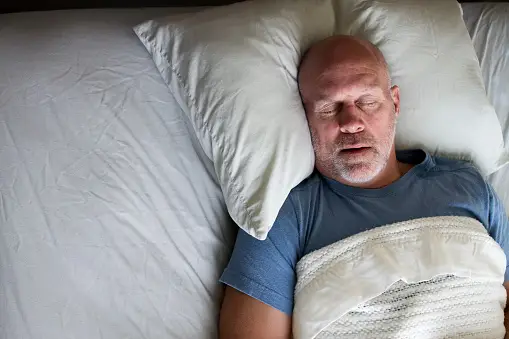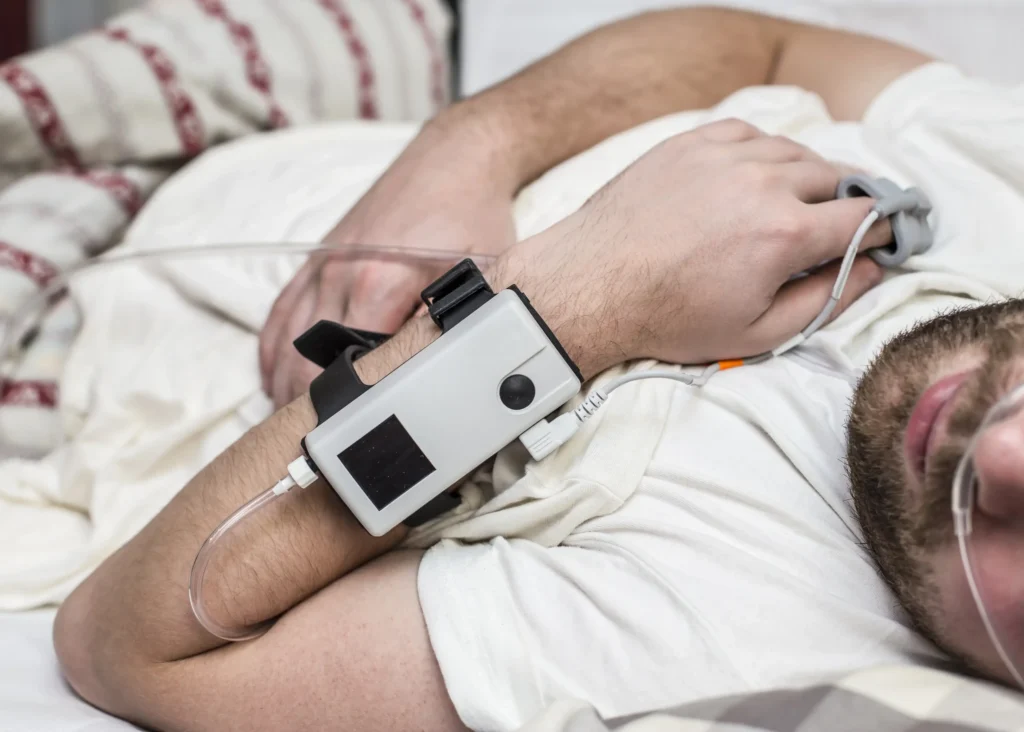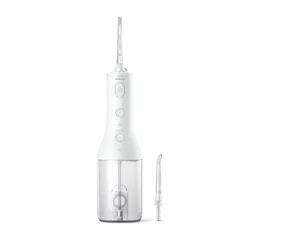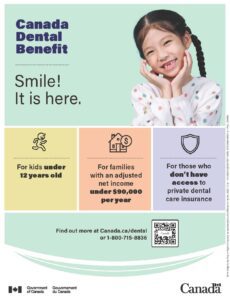Sleep apnea treatment is a sleep disorder characterized by pauses in breathing during sleep. It can result in disrupted sleep, excessive daytime sleepiness, and a range of health issues, including cardiovascular disease and cognitive impairment.
What Is Sleep Apnea treatment?
Sleep apnea treatment is a common sleep disorder that affects breathing during sleep. It occurs when the upper airway becomes blocked, leading to pauses in breathing that can last for seconds to minutes.
Definition Of Sleep Apnea treatment
Sleep apnea treatment is a condition where breathing stops and starts repeatedly during sleep. This disturbance in breathing decreases the amount of oxygen reaching the brain and body, impacting one’s overall health.
Types Of Sleep Apnea treatment
- Obstructive Sleep Apnea (OSA): Most common form, occurs when throat muscles relax.
- Central Sleep Apnea: Involves the central nervous system failing to signal muscles to breathe.
- Complex Sleep Apnea Syndrome: Combination of obstructive and central sleep apnea.
Causes And Risk Factors
Obesity
Being overweight increases the risk of developing sleep apnea treatment .
Age
As individuals age, the likelihood of sleep apnea can increase.
Gender
Men are more likely to experience sleep apnea compared to women.
Family History
A history of sleep apnea in the family can elevate the risk.
Smoking And Alcohol Consumption
Smoking and excessive alcohol intake are associated with an increased risk.
Symptoms And Signs
Sleep apnea Symptoms and Signs include loud snoring, gasping for air during sleep, daytime fatigue, and difficulty concentrating. These indicators may suggest a sleep disorder that requires medical attention. Regular assessments can help in the diagnosis and management of sleep apnea.
Excessive Daytime Sleepiness
Excessive daytime sleepiness is one of the most common symptoms of sleep apnea. If you find yourself feeling excessively tired during the day, even after a full night’s sleep, it could be a sign that you are not getting enough restorative sleep due to sleep apnea. This constant fatigue can impact your ability to concentrate, perform daily tasks, and even pose a safety risk while driving or operating machinery.
Loud Snoring
Loud, persistent snoring is another telltale sign of sleep apnea treatment . If you or your partner notice that your snoring is consistently loud and disruptive, it may be a sign that your airway is partially or fully obstructed during sleep. The repetitive narrowing and reopening of the airway causes vibrations in the throat, resulting in the characteristic snoring sound.
Gasping Or Choking Episodes
Gasping or choking episodes during sleep are alarming symptoms that should not be ignored. These episodes occur when the airway becomes completely blocked, causing a brief interruption in breathing. You may wake up abruptly with a gasping or choking sensation, struggling to catch your breath. These episodes can not only disrupt your sleep but also pose serious health risks if left untreated.
Morning Headaches
Waking up with frequent morning headaches can be indicative of sleep apnea. The repeated disruptions in breathing during the night can lead to reduced oxygen levels in the brain, triggering headaches upon waking. If you consistently experience morning headaches and have ruled out other potential causes, it is important to consider the possibility of sleep apnea treatment as an underlying factor.
Difficulty Concentrating
Sleep apnea can greatly affect your cognitive function and ability to concentrate. If you find yourself struggling to focus, experiencing memory lapses, or having difficulty staying alert throughout the day, it could be a result of the interrupted sleep caused by sleep apnea. By addressing the sleep apnea, you may notice a significant improvement in your mental clarity and overall cognitive abilities.
Diagnosis
Clinical evaluation and diagnosis of sleep apnea are crucial in understanding the severity of the condition, determining the appropriate treatment, and improving the patient’s quality of life.
Medical History Evaluation
The initial step in diagnosing sleep apnea involves a comprehensive review of the patient’s medical history, focusing on symptoms such as excessive daytime sleepiness, loud snoring, observed breathing pauses during sleep, and morning headaches.
Additionally, the healthcare provider will inquire about the patient’s medical conditions, family history of sleep disorders, and any medications that might influence sleep patterns.
Sleep Study (polysomnography)
A polysomnography, commonly known as a sleep study, is a diagnostic test that records various bodily functions during sleep, including brain waves, eye movements, muscle activity, heart rhythm, and breathing patterns.
This comprehensive assessment is usually conducted in a specialized sleep center or hospital, providing valuable data to diagnose sleep apnea treatment and assess its severity.
Home Sleep Apnea treatment Test
For some individuals, a home sleep apnea test may be recommended as a more convenient and cost-effective alternative to polysomnography.
This simplified monitoring device focuses on measuring breathing patterns, heart rate, and blood oxygen levels during sleep, offering crucial insights for the diagnosis of sleep apnea.
Treatment Options
Sleep apnea can be treated with various options, including continuous positive airway pressure (CPAP), oral appliances, and surgery. CPAP therapy is often the first choice, using a machine to deliver air pressure to keep the airways open during sleep. Oral appliances can also be effective, especially for mild to moderate cases.
Obstructive sleep apnea is a common sleep disorder that can have serious health consequences if left untreated. Thankfully, there are several treatment options available to help manage this condition and improve the quality of sleep. Let’s explore the various approaches to treating sleep apnea treatment: `
Continuous Positive Airway Pressure (cpap)
One of the most common and effective treatments for sleep apnea is the use of a Continuous Positive Airway Pressure (CPAP) machine. This device delivers a constant flow of air through a mask worn during sleep, preventing the airway from collapsing and maintaining regular breathing patterns. CPAP therapy is often the first-line treatment for moderate to severe sleep apnea, and it has been shown to significantly reduce the frequency of breathing interruptions during sleep. `
Oral Appliances
For individuals with mild to moderate sleep apnea treatment or those who struggle with CPAP therapy, oral appliances may offer an alternative solution. These custom-fitted devices are designed to reposition the jaw and tongue to keep the airway open while sleeping. By helping to maintain proper alignment of the upper airway, oral appliances can effectively reduce snoring and improve breathing patterns, providing relief for sleep apnea sufferers. `
Lifestyle Changes
In addition to medical interventions, making lifestyle changes can also play a significant role in managing sleep apnea treatment. Strategies such as maintaining a healthy weight, avoiding alcohol and sedatives before bed, and establishing a regular sleep schedule can help alleviate symptoms and promote better sleep quality. Engaging in regular physical activity and elevating the head during sleep are also recommended lifestyle modifications to support the treatment of sleep apnea. `
Surgery
In cases where other treatment options have been ineffective or are not suitable, surgical interventions may be considered. Surgical procedures for sleep apnea aim to correct anatomical abnormalities that contribute to airway obstruction, such as enlarging the airway or repositioning tissues. However, surgery is typically reserved for specific cases and is not the first line of treatment for most individuals with sleep apnea treatment . By exploring these treatment options, individuals with sleep apnea treatment can work with healthcare professionals to find the most suitable approach for managing their condition and improving their overall well-being.
Complications
Sleep apnea is a serious sleep disorder that can have a range of complications on your health and well-being. It is not just a condition that disrupts your sleep, but also puts you at a higher risk for various other health issues. Here are some of the potential complications associated with sleep apnea:
High Blood Pressure
One of the most common complications of sleep apnea treatment is high blood pressure, also known as hypertension. When you experience pauses in breathing during sleep, it causes oxygen levels in your body to drop. This, in turn, can lead to an increase in blood pressure. Over time, if left untreated, it can lead to more serious cardiovascular problems.
Heart Problems
Sleep apnea treatment has been linked to an increased risk of heart problems, such as coronary artery disease, heart attacks, and arrhythmias. The repeated interruptions in breathing can put extra strain on your cardiovascular system, impacting the proper functioning of your heart. It’s crucial to address sleep apnea to reduce the risk of developing these heart-related issues.
Type 2 Diabetes
Individuals with sleep apnea are at a higher risk of developing type 2 diabetes. The lack of oxygen during sleep apnea treatment episodes can disrupt the way your body regulates glucose, leading to insulin resistance. This means your body cannot effectively use insulin to regulate blood sugar levels, increasing the likelihood of developing diabetes.
Liver Problems
Sleep apnea treatment has also been associated with liver problems, particularly non-alcoholic fatty liver disease (NAFLD). The interruptions in breathing during sleep can lead to a decrease in oxygen levels, impacting liver function. This can result in the accumulation of fat in the liver, which can progress to more severe liver conditions if not addressed.
Tips For Better Sleep
Discover some practical strategies to improve your sleep and manage sleep apnea treatment effectively:
Maintain A Regular Sleep Schedule
Go to bed and wake up at the same time every day to establish a consistent routine.
Create A Comfortable Sleep Environment
Ensure your sleeping area is cool, dark, and quiet to promote restful sleep.
Limit Electronic Device Usage Before Bed
Avoid screens an hour before bedtime as the blue light can disrupt your sleep cycle.
Practice Relaxation Techniques
Engage in deep breathing or meditation to calm your mind and prepare for sleep.
Also Read,
Sleep Apnea Solutions: Breathe Easy, Rest Better!
Are Home Remedies for Teeth Whitening Safe?
Understanding The Role of A Dentist in Scarborough
Frequently Asked Questions For Sleep Apnea treatment
What Are The Symptoms Of Sleep Apnea treatment ?
Sleep apnea symptoms include loud snoring, pauses in breathing during sleep, waking up with a dry mouth or sore throat, morning headaches, excessive daytime sleepiness, and irritability.
How Is Sleep Apnea Diagnosed?
Sleep apnea is diagnosed through a sleep study, where a healthcare provider monitors breathing, heart rate, oxygen levels, and body movements during sleep to determine if sleep apnea is present.
Can Sleep Apnea Lead To Other Health Issues?
Yes, untreated sleep apnea can lead to other health issues such as high blood pressure, heart disease, stroke, diabetes, and depression. It’s important to seek treatment for sleep apnea to reduce these risks.
What Are The Treatment Options For Sleep Apnea?
Treatment options for sleep apnea may include lifestyle changes, such as weight loss or avoiding alcohol before bed, using a CPAP machine, oral appliance therapy, or in some cases, surgery to improve airflow.
Conclusion
Sleep apnea treatment is a serious sleep disorder that affects many individuals worldwide. By understanding the symptoms and seeking appropriate diagnosis and treatment, you can improve your overall quality of life. Remember to consult with a healthcare professional for personalized advice. Together, we can work towards a better night’s sleep and a healthier, happier future. Take control of your sleep health today!







